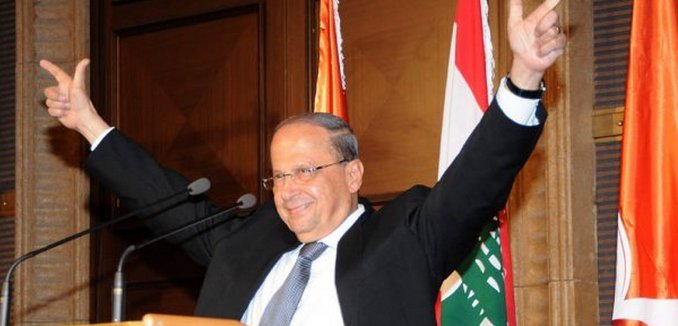Lebanon’s newest president, a retired general who is firmly allied with the Iran-backed terrorist organization Hezbollah, threatened Israel in his inaugural address in Beirut on Monday, The Times of Israel reported.
Michel Aoun secured 83 votes in parliament, comfortably exceeding the majority required to win the presidency in the 128-seat chamber. His election ended a two-year political standoff in the country, during which the presidency remained vacant. The turning point came when former Prime Minister Sa’ad Hariri, leader of the mainly Sunni Future Movement, agreed to support Aoun, apparently in return for being re-appointed prime minister.
Hariri’s reversal is dramatic. In a New York Times op-ed published last month, the politician demanded that Iran stop meddling in the internal affairs of Arab countries and destabilizing the Middle East. He also accused Hezbollah of turning “its weapons against the Lebanese people.” Hariri father was assassinated in 2005, a crime widely thought to have been committed by Hezbollah. Four Hezbollah operatives have been charged in absentia for their role in the killing by a United Nations court in The Hague.
In his introductory speech to parliament, Aoun said that his government would “not spare any efforts to protect Lebanon from Israel and liberate the remainder of our lands; we will address terrorism in a preemptive manner.”
Israel completed its withdrawal from Lebanese territory, which it occupied after the 1982 Lebanon War, in May 2000. The total withdrawal was recognized by the United Nations Security Council, which affirmed in June of that year that “Israel had withdrawn its forces from Lebanon in accordance with Security Council resolution 425.”
Aoun’s vow to “liberate” Lebanese territory from Israel is a reference to Shebaa Farms, an area known as Mount Dov in Israel, which was captured by Israel in 1967 from Syria and had never been considered part of Lebanon. (The UN concluded that there is no evidence to support Lebanese claims to the territory after studying 81 different maps, according to a UN envoy.)
“After 2000, ‘liberating’ Shebaa Farms and ‘reuniting’ the area with Lebanon became Hezbollah’s excuse for holding onto its weapons in defiance of numerous UN resolutions,” the Foundation for Defense of Democracies explained in a 2006 report.
In 2005, then-UN Secretary General Kofi Annan rejected the Lebanese government’s claim that Shebaa Farms was Lebanese territory in a report (.pdf) to the Security Council:
The continually asserted position of the Government of Lebanon that the Blue Line is not valid in the Shab’a farms area is not compatible with Security Council resolutions. The Council has recognized the Blue Line as valid for purposes of confirming Israel’s withdrawal pursuant to resolution 425 (1978). The Government of Lebanon should heed the Council’s repeated calls for the parties to respect the Blue Line in its entirety.
Iran has celebrated Aoun’s election as a victory for Hezbollah, Reuters reported. “The election of Michel Aoun as president shows new support for the Islamic resistance (against Israel),” Ali Akbar Velayati, Supreme Leader Ayatollah Ali Khamenei’s top foreign policy adviser, told Iran’s Tasnim news agency. “This is surely a victory for Sayyed Hassan Nasrallah, the leader of (Hezbollah and) Islamic Resistance in Lebanon.”
Iran’s declaration of victory comports with Reuter’s assessment last week that Aoun’s victory would mark “the ascendancy of the Iranian-backed Hezbollah movement and the diminished role of Saudi Arabia in the country.”
Hezbollah has blocked the appointment of any president other than Aoun during the more than two years since his predecessor Michel Suleiman’s term ended.
[Photo: Imadmhj / WikiCommons ]




